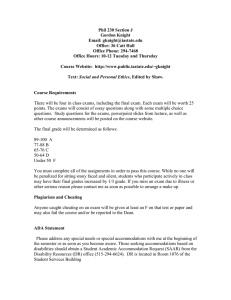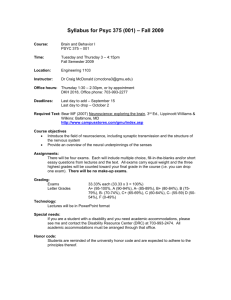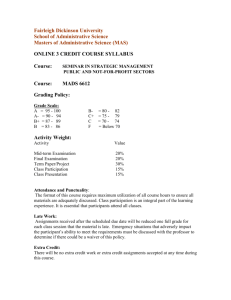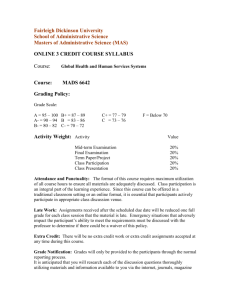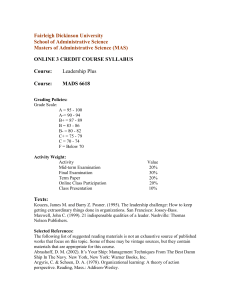Word
advertisement
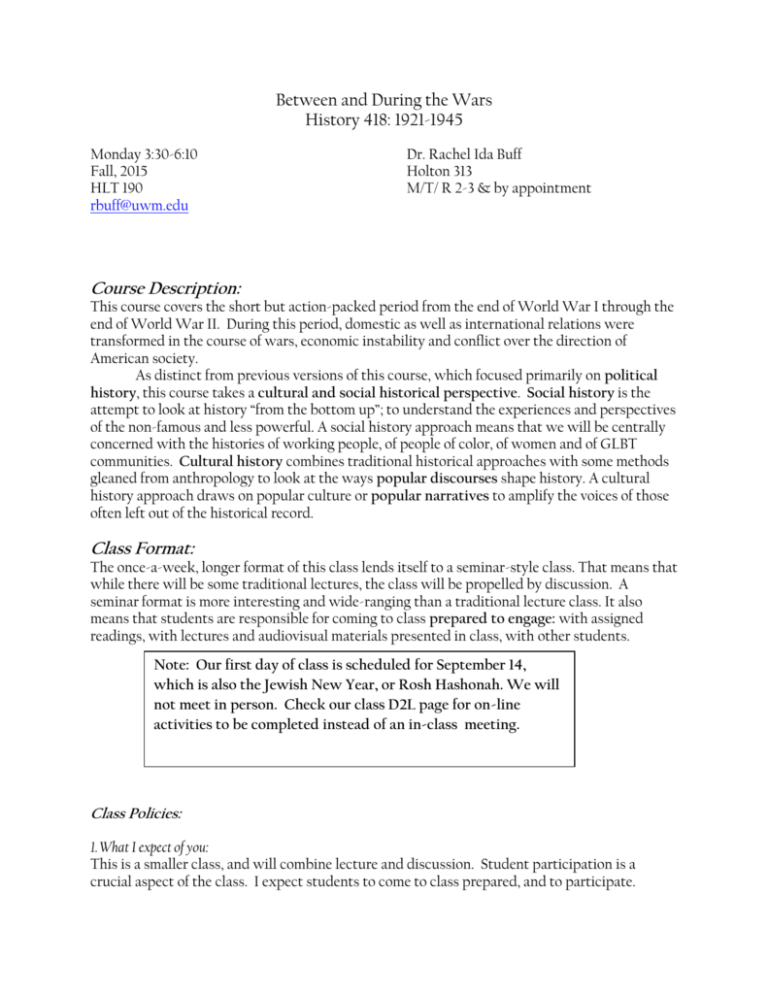
Between and During the Wars History 418: 1921-1945 Monday 3:30-6:10 Fall, 2015 HLT 190 rbuff@uwm.edu Dr. Rachel Ida Buff Holton 313 M/T/ R 2-3 & by appointment Course Description: This course covers the short but action-packed period from the end of World War I through the end of World War II. During this period, domestic as well as international relations were transformed in the course of wars, economic instability and conflict over the direction of American society. As distinct from previous versions of this course, which focused primarily on political history, this course takes a cultural and social historical perspective. Social history is the attempt to look at history “from the bottom up”; to understand the experiences and perspectives of the non-famous and less powerful. A social history approach means that we will be centrally concerned with the histories of working people, of people of color, of women and of GLBT communities. Cultural history combines traditional historical approaches with some methods gleaned from anthropology to look at the ways popular discourses shape history. A cultural history approach draws on popular culture or popular narratives to amplify the voices of those often left out of the historical record. Class Format: The once-a-week, longer format of this class lends itself to a seminar-style class. That means that while there will be some traditional lectures, the class will be propelled by discussion. A seminar format is more interesting and wide-ranging than a traditional lecture class. It also means that students are responsible for coming to class prepared to engage: with assigned readings, with lectures and audiovisual materials presented in class, with other students. Note: Our first day of class is scheduled for September 14, which is also the Jewish New Year, or Rosh Hashonah. We will not meet in person. Check our class D2L page for on-line activities to be completed instead of an in-class meeting. Class Policies: 1. What I expect of you: This is a smaller class, and will combine lecture and discussion. Student participation is a crucial aspect of the class. I expect students to come to class prepared, and to participate. Participation means: • Coming to class on time • Coming to class (missing more than two classes will result in a loss of 5 points to your final grade) • completing each day’s reading • staying current with your email- if you use a non-uwm account, have your uwm email forwarded to it • checking D2L for assignments and readings and announcement • bringing books to class, as appropriate • putting cell phones on “mute” • using laptops only to take or review notes, or check on on-line readings • missing class only when absolutely unavoidable. You get one free miss, no questions asked: after that it will affect your grade without the appropriate documentation. • Handing in written work on time. I can deduct 5 points for every 24 hours a paper or worksheet is late. • Showing up for appointments scheduled with me. 2. What you may expect of me: • I will answer email within 24 hours of receiving it. I do not, however, read email from sundown on Friday evening to sunset on Saturday, so my response time during this period will be slower. • I will be in my office during scheduled office hours and appointments. • I will return written work and exams within a 10 day window. • I will almost always remember to silence my cell phone during class Course Work Written Work 1. Take-home unit exams: There are three exams in this class, one at the conclusion of each unit of study. You will receive the questions in class on Monday; the exams are due the following Friday @ Midnight. 2. Popular Front Literature project: Students will select from a list of literary texts written during the 1930s and 1940s. Each student will read the entire book. Working with other students, you will design an educational and entertaining class presentation giving some background on the book, its author, and its historical context. 3. Independent research projects: Each student will design a research project. This project will use primary and secondary sources to create a 10-12 paper about an area of interest of your choice. Grading In order to receive a passing grade in this course, students must complete ALL assigned work. No incompletes will be given. Participation: 3 take home exams (@ 20): Popular Front lit presentation: Research project: 10% 60% 10% 20% Readings All students should come to the first class meeting on September 21 with all three books!! Richard Polenberg, The Era of Franklin D. Roosevelt, 1933-45: A Brief History with Documents Jeffrey B. Ferguson, The Harlem Renaissance: A Brief History with Documents Natalia Molina, How Race is Made in America: Immigration, Citizenship and the Historical Power of Racial Scripts These books are available @ People’s Book Cooperative, 804 East Center Street (Riverwest) Milwaukee; (414)962-0575 Hours: Monday – Saturday 10am – 6pm Sunday 12pm – 4pm Other readings will be available on D2L. These are required readings. I have tried to keep the cost of course readings to a minimum. The two “Brief History With Documents” books are available used on-line for less than $5; the Natalia Molina book is also available at a discounted rate at many websites. Shop early!
